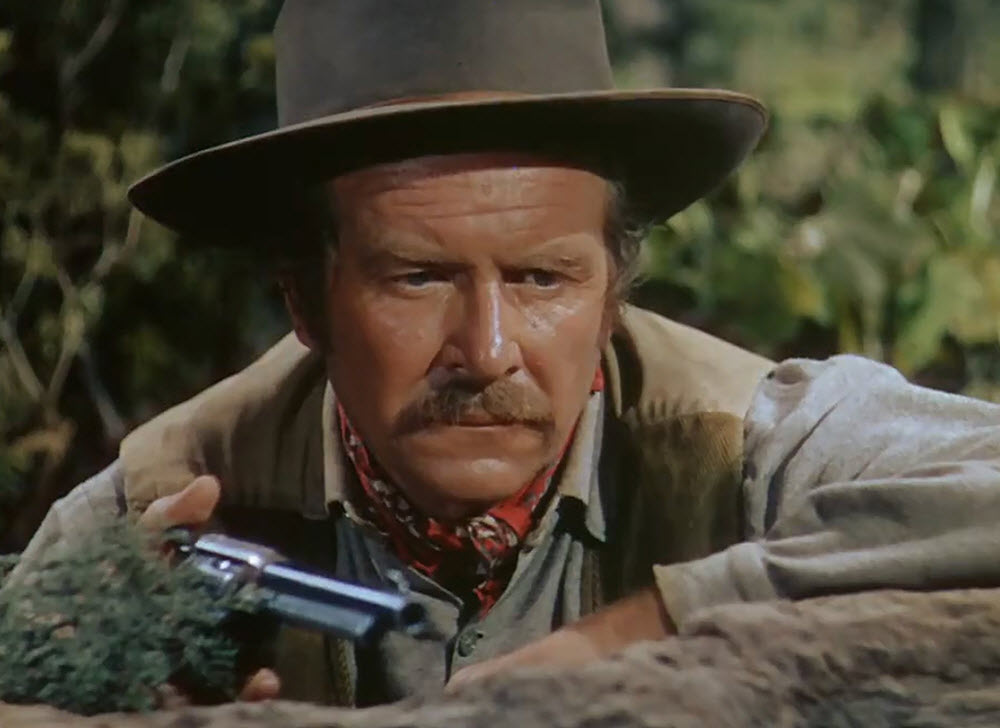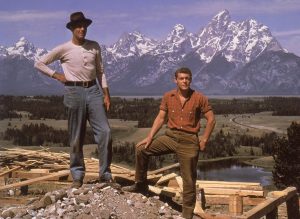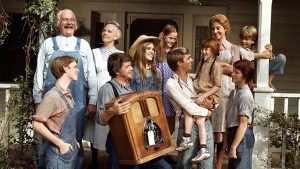Will Geer (1902-1978) was a United States actor, musician, and social activist. Among other things, he is well known for his role as Grandpa Zebulon “Zeb” Walton in the TV-series The Waltons, a role he performed from 1972 until his death in 1978, and which garnered him widespread fame and also earned him an Emmy Award.
Geer´s long career started in 1927 and included a wide range of endevours. In addition to acting in movies and TV-shows, he was also in musicals, performed in travelling tent shows and on riverboats, got great reviews on Broadway, appeared in revues, and did a lot of work for radio.
Geer was active in labour organizing and related political movements in New York and California in the 1930s and 1940s and was blacklisted in Hollywood in the 1950s after refusing, in testimony before Congress, to name persons who had joined the Communist Party.
Will Geer, a name synonymous with passion, talent and versatility, made an indelible mark in the realms of both stage and screen. His multifaceted talent, combined with his compelling personality, etched a memorable legacy that continues to inspire and captivate audiences worldwide. This article endeavours to delve into the life and legacy of this remarkable figure.
His life and career embody a compelling narrative of talent, passion, and resilience. His contributions to theatre and cinema, combined with his political activism and love for botany, have cemented his status as an iconic figure. His enduring charm and charisma continue to captivate audiences, underlining the timeless relevance of his works.

Early Life and Education
Born on March 9, 1902, in Frankfort, Indiana, William Aughe Ghere, later known as Will Geer, was the son of Katherine (née Aughe), a teacher, and Roy Aaron Ghere, a postal worker. The father left the family when Will was 11 year old.
Will had a close bond with his grandfather, who was a major influence on him and taught him the botanical names of the plants in Indiana. Will eventually obtained a master´s degree from the University of Chicago with a major in botany, a discipline that would later become an essential part of his life away from acting. At college, Will was a member of Lambda Chi Alpha, and his journey into the world of drama began with his involvement in college theatre.
Broadway and Early Career
Will Geer, who had now anglicized his name, began his acting career in tourin tent shows and by peforming on riverboats, before getting a breakthrough due to his performances on Broadway. He made his debut there in a 1928 in a production of “The Merry Wives of Windsor”. In New York, his knack for bringing characters to life with his unique interpretations and charismatic persona quickly made him a favourite among theatre aficionados, and his performances in “Of Mice and Men” and “Tobacco Road” are still lauded as some of his finest work on stage.
Hollywood movies
After a successful stint on Broadway, Geer transitioned into the world of cinema. His first film, “Misleading Lady”, was released in 1932. In 1948-1951, he appeared in a dozen movies, including Winchester ´73, Broken Arrow, Comanche Territory, and Bright Victory.
After being blacklisted by Hollywood in the 1950s, he eventually returned to the big screen as the political climate changed in the United States. A notable post-blacklist performance by Geer can be seen in the 1967 movie In Cold Blood (based on Truman Capote´s novel of the same name), where he performed a soliloquy as the prosecutor delivering the closing argument against the two murderers. Another notable performance is his interpretation of the character Bear Claw in the 1972 Western movie Jeremiah Johnson, a film based partly on the life of legendary mountain man John Jeremiah Johnson. The movie starred Robert Redford as the title character and Geer as “Bear Claw” Chris Lapp.
Outside Hollywood
Unlike many other actors, Geer had a thriving career not just in Hollywood but also elsewhere, including on Broadway and in various radio shows.
As mentioned above, he worked on stage in New York early in his career, and he would also return to the stage later. He did, for instance, perform with the Group Theatre (New York), studying under Harold Clurman, Cheryl Crawford and Lee Strasberg. He created the role of Mr. Mister for Marc Blitzstein’s The Cradle Will Rock, played the role of Candy in John Steinbeck’s theatrical adaptation of the masterpiece Of Mice and Men, and in the late 1950s and early 1960s, he did several seasons with the American Shakespeare Festival in Stratford, Connecticut. In 1964, his performance in the musical 110 in the Shade earned him a Tony Award nomination in the category Best Featured Actor in a Musical.
For the radio, Geer appeared as Mephistopheles in the 1938 and 1944 production of The Plot to Overthrow Christmas, and he was also a part of the radio soap opera Bright Horizons.
Political Activism and Blacklisting
Geer’s contributions weren’t limited to just the performing arts. He was also a dedicated activist, using his platform to champion civil and labor rights. During the Great Depression, he toured government work camps with folk singers such as Woody Guthrie and Burl Ives, and he introduced Guthrie to Pete Seeger at the 1940 ‘Grapes of Wrath’ benefit organized for migrant farm workers.
Geer put his abilities to use in several social commentary documentaries, including Sheldon Dick´s Men and Dust, a documentary – narrated by Geer about – silicosis among miners.
Due to his outspoken nature, political work, and refusal to give up the names of Communist party members, Geer was blacklisted during the McCarthy era. However, he remained undeterred and continued making his voice heard on various social issues.
The Blacklisting of Will Geer
In the early 1950s, Geer refused to testify before the House Committee on Un-American Activities. As a result, he was blacklisted in Hollywood and appeared in very few films in the 1950s. One notable exception is the 1954 Salt of the Earth, a movie written, produced and directed by blacklisted Hollywood personnel, and which also featured blacklisted actors. The film, which takes a pro-union stance, was denounced as subversive back then but is today seen in a different light. In 1992, it was added to the U.S. National Film Registry.
The Waltons
In 1972, Geer was cast as Grandpa Zebulon “Zeb” Walton, the patriarch of the Walton family in the much-loved TV series The Waltons. This was a role that Geer would keep doing until he died in 1978, shortly after completing the sixth season of the series. When Geer died, the role was not re-cast with any other actor. Instead, the death of Zeb was written into the script, and Grandpa Zeb was mourned onscreen by the Waltons during the first episode of the 1978–1979 season, titled “The Empty Nest”.
Emmy Award
In 1975, Geer won an Emmy in the category Outstanding Supporting Actor in a Drama Series for his work with The Waltons.
Botany and Theatricum Botanicum
As mentioned above, Geer´s grandfather gifted him with a passion for botany, and Geer studied the subject at the University of Chicago before becoming a professional actor. Later, Geer’s passion for botany led him to establish the Theatricum Botanicum in 1951, together with his wife, the actress Herta Ware. At the Theatricum Botanicum, an outdoor theatre and botanical garden in Topanga, California, Geer cultivated every plant mentioned in Shakespeare´s plays. The establishment became a reflection of Geer’s twin loves – theatre and nature – and Theatricum Botanicum also served as a haven for blacklisted actors during the McCarthy era, reflecting Geer´s political stance.
Other gardens
Geer also maintained gardens at his vacation houses in Connecticut and California. The one in Nichols, Connecticut, he referred to as the Geer-Gore Gardenm, and he would often be there to celebrate the 4th of July, sometimes combining his trademark denim overalls with a black top hat or a straw hat. His vacation house in California was located in Solana Beach, where he grew vegetables in not just the back garen but the front garden as well.
Personal Life
Will Geer and the U.S. actress and activist Herta Ware married in 1934. Together, they had three children: Kate Geer, Thad Geer, and the actress Ellen Geer. In another marriage, Herta Ware had a daughter named Melora Marshall. The couple divorced in 1954, after 20 years of marriage, but remained close friends for the rest of their lives.
Parallel to his marriage with Herta Ware, Geer was in a relationship with Harry Hay, today known as a prominent gay rights activist, communist, and labour advocate. Geer introduced Hay to Los Angeles´ leftist community, and Hay would later acknowledge Geer as his political mentor. Among other things, they participated in a milk strike in Los Angeles and performed together in support of the San Francisco General Strike. Once, they handcuffed themselves to lampposts outside the UCLA and handed out leaflets for the American League Against War and Fascism.
Death and Legacy
Geer died in Los Angeles on April 22, 1978, at the age of 76. The cause of death was respiratory failure. As he was daying, his family was with him, reciting poems by Robert Frost, and singing Woody Guthrie´s song This Land Is Your Land.
His remains were cremated and his ashes were buried in the Shakespeare Garden of his beloved Theatricum Botanicum.
Will Geer left a profound legacy that transcends his roles in stage and screen. His dedication to his craft, his commitment to his social and political beliefs, and his love for nature have made him an enduring figure in U.S. culture. His life’s work continues to inspire countless artists and activists.

